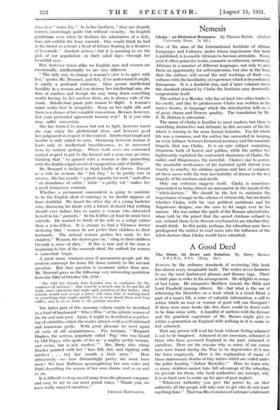Nemesis
ONE of the aims of the International Institute of African Languages and Cultures, under whose imprimatur this book is published, is to enable Africans to become articulate. Every year it offers prizes for works, romantic or otherwise, written by Africans in a number of different languages, not only to give them an opportunity for self-expression, but also in the hope that the authors will reveal the real workings of their own cultures with the familiarity of experience which is beyond most Europeans. It is a laudable aim, and if later volumes reach the standard attained by Chaka the Institute may deservedly congratulate itself.
The author is a Mosuto, who has at least two other books to his credit, and like its predecessors Chaka was written in his native Sesuto, in language which the introduction tells us is of great charm and literary quality. The translation by Mr. F. H. Dutton is admirable.
The name of Chaka is familiar to most readers, but there is something distinctive and intimate in this account of his life which is missing in the more formal histories. For his whole life was a romance, and the author has succeeded in keeping an even balance between historical accuracy and the romantic tragedy that was Chaka. It is an epic subject containing situations both of horror and pathos, while the author has legitimately exploited the contrasted characters of Chaka, the sadist, and Dingiswayo, the merciful. Chaka's rise to power, the insatiable restlessness of his tortured spirit driven from cruelty to cruelty, his sublime egotism and lust of conquest, all these move with the true inevitability of drama to the last tragedy of his madness and death.
Only one criticism suggests itself. Chaka is sometimes represented as being almost an automaton in the hands of the "witch-doctors." We should be the last to minimize the importance of magic in the scheme of African life, but we doubt whether Chaka, with his vast political ambitions and his Napoleonic designs, was the man to let magic ever be his master. His was rather the spirit of the Roman admiral who, when told by the priest that the sacred chickens refused to eat, ordered them to be thrown overboard to see whether they would drink. In this point, perhaps, his education may have predisposed the author to read more into the influence of the witch-doctors than Chaka would have admitted.






























 Previous page
Previous page